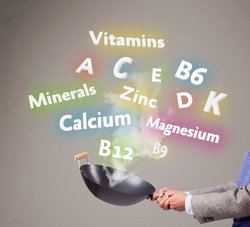Micronutrients are chemical elements or substance required, in trace amounts, for the normal growth and development of living organisms. We commonly refer to them as, vitamins and minerals. The word micro, in front of nutrient, indicates that these substance are required in small amounts in our diet. Small amounts yes, but their role in our health is essential.
“A vitamin is a substance that makes you ill if you don’t eat it.” (Albert Szent-Gyorgyi, Nobel Prize in Physiology or Medicine, 1937).
This statement alone is enough for most of us, to check our vitamin consumption. However, if you are not yet convinced; did you know that you could have a nutritionally or calorically appropriate diet and still suffer from malnutrition? This malnutrition is due to eating food that is cheap and filling but deficient in essential vitamins and minerals. Micronutrient malnutrition is often refereed to as “hidden Hunger”. Contrary to popular belief, this condition is not just for the poor, but quite prevalent in developing countries, including the United States. Beyond diet deficiencies, there are times throughout life when the body requires more micronutrients; then the typical diet may provide. Such as iron during pregnancy and vitamin B12, after age of 50 years.
Related Article: Macronutrients – more then just the basics
Micronutrients – The Basics
Vitamins
Vitamins are organic substances that play an active part as coenzymes in complex biochemical reactions. Simply stated, vitamins ensure proper utilization of proteins, fats and carbohydrates – food – to provide energy.
Vitamin Classifications:
Water-soluble vitamins are not stored in the body and any excess amount is flushed out. Therefore, it is necessary to take water-soluble vitamins on a daily bases. Some examples include: B vitamins, Biotin, Fotate, vitamin C and vitamin A
Fat-soluble vitamins are dissolved and stored in fatty tissues of the body. Therefore, they can be ingested less often. Some examples include: vitamin A, vitamin D, vitamin E and vitamin K.
Minerals
Minerals are inorganic trace elements frequently involved in modulating enzyme activity. Often, minerals are key components that assist in activating enzymes. Some minerals are required in greater amounts and others in just trace amounts.
Minerals required in substantial amounts:
Calcium, Phosphorus, Magnesium, Sodium, Chlorine, Potassium, Sulfur
Mineral required in trace amounts:
Iron, Zinc, Copper, Iodine, Manganese, Fluoride, Molybdenum, Cobalt, Selenium, Chromium
Why do we need Micronutrients?
Deficiencies in one or more micronutrients, over time, may lead to serious health issues. These can include anemia (iron deficiency), neural tube defects (folic acid deficiency) and osteoporosis (calcium deficiency).
Vitamins and minerals do not serve as an energy source for the body; or provide raw materials for tissue building – like macronutrients. Rather, their purpose is to carry forward reactions (metabolism) that provide energy. In the case of mineral iron, it is essential for proper functioning of the red blood cells to bind and transport oxygen throughout the body. Deficiency in iron will lead to fatigue and weakness. Similarly, deficiency in vitamin B12 and folate will lead to similar problems, as these are needed to make red blood cells. The human body is able to synthesize a couple of vitamins like Vit D, but sun is essential to carry this process forward. In general, the body can not make the required essential vitamins; these must come from the diet.
Best foods to meet your Micronutrients?
Science time and time again suggests, eating patterns that include relatively high intake of fruits, vegetables, nuts and whole grains are linked to a significantly lower risk of heart disease, cancer and stroke. It is unlikely, just because these foods provide micronutrients. These foods also provide, complex carbohydrates (fiber), essential fats, protein along with phytochemicals, vitamins and minerals.
A balanced and varied diet is the best source of essential vitamins and minerals. A multivitamin and mineral supplement can assist in filling nutritional gaps; where diets lack. Adding a daily green smoothie will help you in meeting your daily required fruits and vegetables quota. Fruits and vegetables are the number one source for getting required vitamins and minerals. Sound advice is to limit takeout foods like burger and fries, chips and donuts. These will fill up your appetite and leave little room for nutritionally rich foods, thereby causing “hidden hunger”.
We discuss this topic further, including effectiveness of supplements, in our The No-Diet book, learn more.
References:
1. Cole, Conrad R. Preventing Hidden Hunger in Children Using Micronutrient Supplementation. The Journal of Paediatrics. Editorial. Vol.161(5).
2. Shenkin, A. Micronutrients in health and disease. Review. Postgrad Med J. 2006; 82:559-567.
3. Ward, Elizabeth. Addressing nutritional gaps with multivitamin and mineral supplements. Nutrition Journal. 2014, 13:72.







